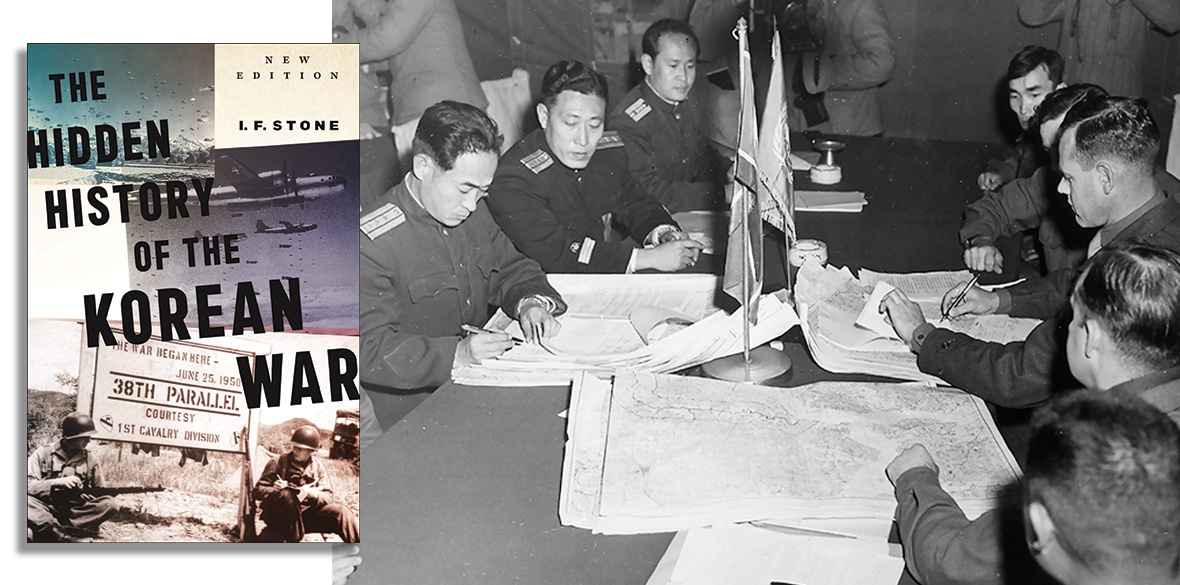This is the last article you can read this month
You can read more article this month
You can read more articles this month
Sorry your limit is up for this month
Reset on:
Please help support the Morning Star by subscribing here
The Hidden History of the Korean War
IF Stone, Monthly Review Press, Kindle: £10.99
JULY 27 2023 marked 70 years since the signing of the armistice agreement at Panmunjom, finally bringing about a cessation of hostilities in a war that was extraordinarily destructive but which has been largely ignored.
As Bruce Cumings writes in his preface to IF Stone’s classic The Hidden History of the Korean War — first published in 1952 and recently reissued by Monthly Review Press — the Korean war is a forgotten war, “remembered mainly as an odd conflict sandwiched between the good war (World War II) and the bad war (Vietnam).”
Stone’s meticulous investigation provides abundant proof that most of the key players in the US government and military actively wanted the Korean war; that it was the right war, in the right place and the right time in terms of US imperialist interests.
Top US generals have since admitted that their “police action” in Korea gave them just the excuse they needed to construct the military infrastructure of cold war in the Pacific: a vast network of overseas bases; large-scale, long-term deployments of US troops in Korea and Japan; and the permanent stationing of nuclear warheads in the region.
The Korean war set the whole military-industrial complex in motion. It created the national security state. It was the first major test case for the Truman Doctrine of “support for democracies against authoritarian threats” and helped establish the US in its self-assumed role of global policeman. By forcing through a United Nations endorsement of its invasion, the US was able to establish its dominance of the UN-based international system.
Reading Izzy Stone’s reporting today, it’s striking the extent to which these mechanisms of cold war still exist and are being used to wage a new cold war. Stone’s book emphasises that peace was very much an option in 1950.
The Soviet Union of course wanted peace; having lost 27 million lives and sustained incredible damage to its infrastructure in the course of saving the world from Nazism, the Soviets needed space to rebuild. The People’s Republic of China also wanted peace; having only been founded in October 1949 after long years of civil war and struggle against Japanese occupation, the last thing the new state needed was to become embroiled in another war (in the event, nearly 400,000 Chinese volunteers gave their lives fighting in Korea).
The US could have accepted the post-WWII reality: that some countries had chosen the path of socialism, and that many other countries were throwing off the shackles of colonialism and seeking to explore an independent path to development.
The US could furthermore have accepted an emerging status quo in East Asia. Before the US invasion, the trajectory was for Korea to be united under a popular, communist-led government; for Taiwan to become part of the People’s Republic of China; for China to regain its rightful seat at the UN; and for US troops to be removed from Japan.
Such a configuration would have reflected the will of the peoples of the region, but it wasn’t consistent with Washington’s idiosyncratic vision of a “rules-based world order.” The major Western powers, led by the US, rejected peace and chose containment, encirclement, blockade and war.
They chose a strategy of doing everything they could to weaken the socialist countries and the forces of national liberation and sovereign development. They chose the cold war — which for the people of Korea, Vietnam, Angola, Nicaragua, Chile, and many other countries of the Global South was not cold at all.
Seventy years later, the West is once again faced with a rising socialism and an irrepressible multipolar trend, at the centre of which is China.
Can the West adapt to this new reality? Or will the US and its allies continue on the ruinous path of a New Cold War — and potentially a devastating hot war?
The Hidden History of the Korean War is essential reading for those who are building a mass anti-war movement that our governments can’t ignore.











